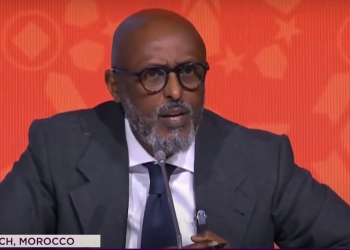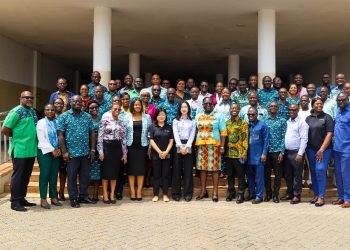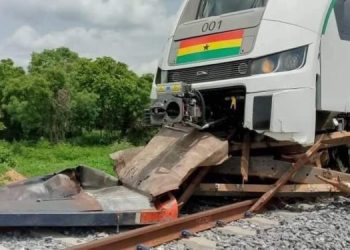The Ministry of Education has challenged the Ghana National Education Campaign Coalition (GNEEC) to provide evidence to back its claims of privatisation of pre-tertiary education or retract and render an unqualified apology.
The ministry stated that at a meeting with GNEEC in 2018, the discussions were on partnership and not privatisation.
Director of Communication at the Education Ministry, Ekow Vincent Assafuah explained that government has never contemplated privatisation of schools.
Ghana Partnership Schools Project
Ghana Partnership Schools (GPS) Project is about non-governmental organisations (NGOs) with the requisite capacity and resources to partner with government.
Pilot regions
GPS Project is intended to give selected public basic schools which are supposed to be basically under-performing a strong managerial support from private operator(s) to manage these selected schools (total of 100 deprived schools in four regions: Ashanti, Northern, Central and Greater Accra).
Improve school supervision and monitoring
These operators are to work hand-in-hand with the GES and other relevant stakeholders to improve school supervision and monitoring, as well as accountability, which is a critical variable in ensuring quality education — a variable that seems to work well in our private schools and some exceptional public schools.
Expected outcome
This partnership is expected to produce excellent results comparable to those schools owned by private individuals and organisations.
Research has revealed that an improvement in stringent monitoring and supervision of instruction in basic schools leads to improvement in learning outcomes.
Empirical evidence
An example is the case of the Suhum Municipality in the Eastern Region, which recorded performance in basic schools around 40% to 42.4% and lowest 39.1% since 2005, but later improved to over 50% in 2009 following “stringent supervision”.
NPP 2016 manifesto promise
Page 108 of the 2016 manifesto of the New Patriotic Party (NPP) states that, “We will build an effective partnership with religious bodies, civic society organisations and the private sector in the delivery of quality education.
“This partnership will also include areas of management, supervision, and training of teachers in their units.”
In line with this promise, Assafuah disclosed that discussions are advanced and ongoing with religious bodies, and it seeks an appropriate regulatory framework to enable this manifesto pledge to be fulfilled.
He, therefore, expressed surprise at the conduct of the President of GNEEC, who sits on the Ministerial Advisory Board and has easy access to senior management for cross-checking information that may have come his way.
“It is the ministry’s position that the GNEEC President must either substantiate his privatisation claim or chose the honourable path of an unqualified apology and an introspection over whether his position on the Ministerial Advisory Board remains tenable,” the Communication Director stressed.
Numerous challenges facing public basic schools
Public basic schools in Ghana are bedevilled with numerous challenges.
Some of these as captured in most research findings include inadequate access, low learning outcomes (reports by EGRA), inadequate, and in some cases lack of, educational resources, inefficient teacher management and support systems, financial challenges, and governance and accountability challenges.
1987 Educational reform
These challenges precede the implementation of the 1987 educational reform.
Governments over the years have made conscious efforts to improve the quality of education at the basic level.
FCUBE in 1995
One of the prominent interventions was the enforcement of the Free Compulsory Universal Basic Education (FCUBE) in 1995, which was targeted at improving access to basic schools.
The major challenge then was enrolment and retention. FCUBE was, therefore, aimed at improving enrolment (by making basic education free) and ensuring retention (by making basic education compulsory).
Capitation Grant scheme
In the 2005/2006 academic year, the Ministry of Education set up the Capitation Grant scheme as a measure to strengthen the free nature of our basic education.
This intervention was a feather in the cap in Ghana’s quest to improve the quality of basic education in Ghana.
School Feeding Programme
There was also the introduction of the School Feeding Programme (SFP) (on a pilot basis) in the 2004/2005 academic year.
Reduce student absenteeism
The SFP aimed at improving retention and also reduce student absenteeism as revealed in a study that formed the basis for the intervention.
2018 to 2030 Strategic Plan
The Ministry of Education has put together a National Education Strategic Plan for the period 2018 to 2030.
The document assesses the various challenges facing all levels of education in Ghana and proposes strategic policy initiatives to tackle them.
An analysis of the various policy initiatives would give one an appreciation of the direction Ghana’s education is heading.
Areas lacking attention
One of the areas that seem to have received little attention in basic schools is the area of school management, supervision, monitoring and accountability.
This has been an area of interest for the general public since there is a paradox of parents preferring to take their wards to private basic schools, which are sometimes expensive as against public basic schools, which is free.
This deepened further when academic achievement of students in private basic schools vary significantly from those in the public basic schools although, in terms of human resources, the public basic schools seem to have more trained and professional teachers.
It is worth noting that there are few public basic schools that are doing very well and are at par with private schools in the country.
–
Source: Finder










